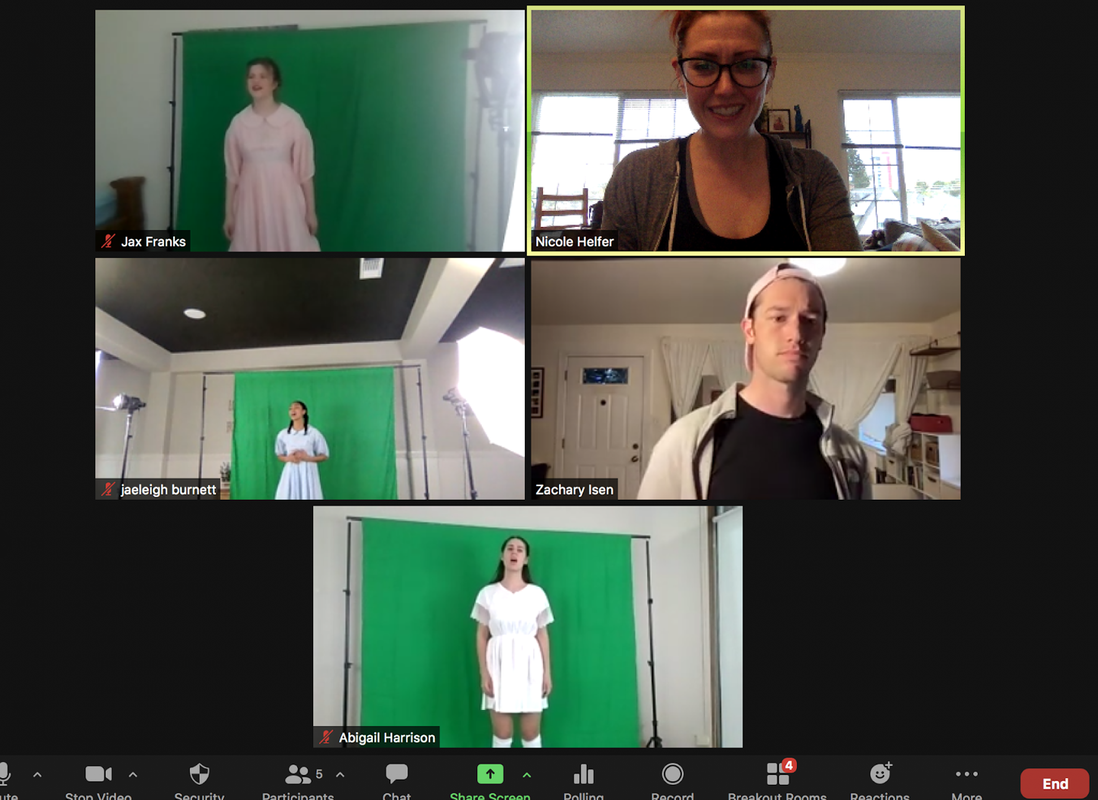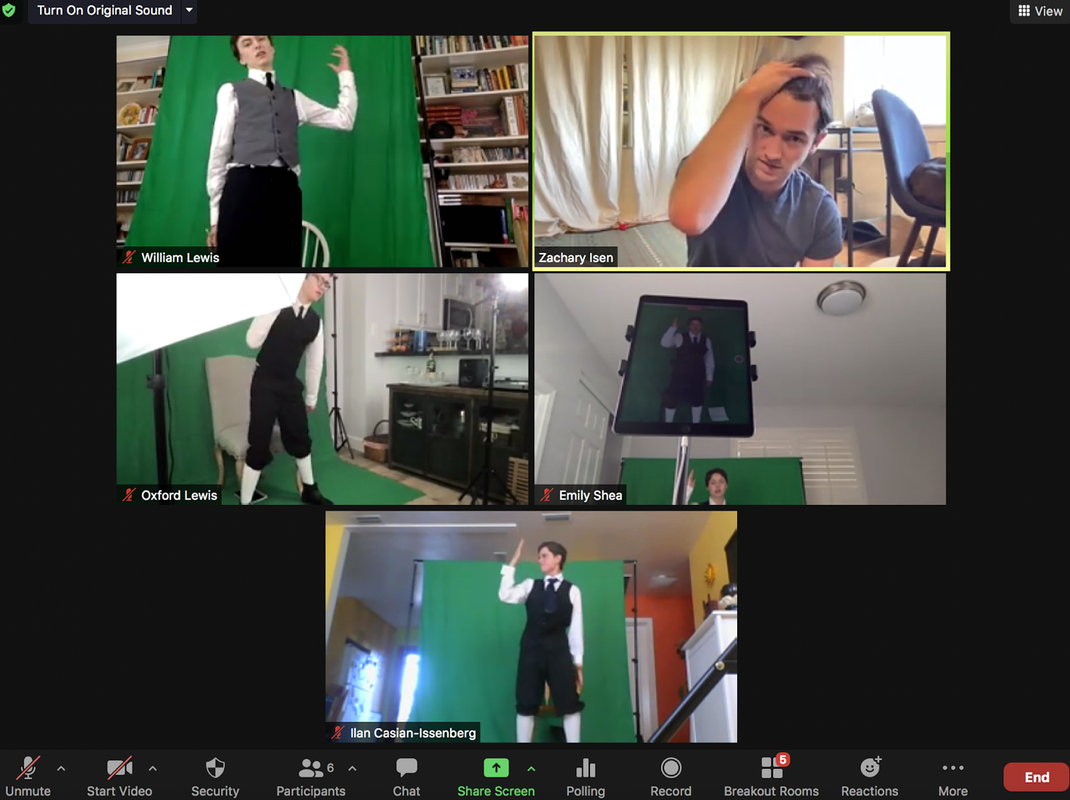Many things have been hard for everyone at OSA due to the pandemic. And the ability to perform has been one of those struggles. Especially for emphasis that really gain from in-person connection. Theatre is an example. So, how has the OSA Theatre Department adapted to this change in lock-down? -- Piper stuip, 7th grade
Many things have been hard for everyone at OSA due to the pandemic. And the ability to perform has been one of those struggles. Especially for emphasis that really gain from in-person connection. Theatre is an example. So, how has the OSA Theatre Department adapted to this change in lock-down?
At the time I’m writing this, there are a couple upcoming shows in the Theatre department.
“First we have bobrauschenbergamerica written by Charles Mee, which is a show devised by the Physical Theatre students in our high school acting program,” says Theatre chair Nicole Helfer, “This show is a fantastical road trip through the American landscape, written as Robert Rauschenberg, one of America’s greatest postmodernist artists, might conceive it. Traveling easily through time, the play is a glorious collection of images and sensations, Rauschenberg’s childhood home, a pizza delivery boy, the world’s worst collection of chicken jokes…”
“Next is our annual New Works Festival in which our playwrights debut original works with the theme Adaptation.” Helfer added. She explained that these new works were “student written, student acted, and student directed.”
“Following that are our three main stage productions: Rosencrantz and Guildenstern are Dead by Tom Stoppard, The Addams Family by Andrew Lippa, and Spring Awakening by Duncan Sheik and Steven Slater.” These shows are collaborations with the Production Design and Digital Media departments, Helfer says.
At the time I’m writing this, there are a couple upcoming shows in the Theatre department.
“First we have bobrauschenbergamerica written by Charles Mee, which is a show devised by the Physical Theatre students in our high school acting program,” says Theatre chair Nicole Helfer, “This show is a fantastical road trip through the American landscape, written as Robert Rauschenberg, one of America’s greatest postmodernist artists, might conceive it. Traveling easily through time, the play is a glorious collection of images and sensations, Rauschenberg’s childhood home, a pizza delivery boy, the world’s worst collection of chicken jokes…”
“Next is our annual New Works Festival in which our playwrights debut original works with the theme Adaptation.” Helfer added. She explained that these new works were “student written, student acted, and student directed.”
“Following that are our three main stage productions: Rosencrantz and Guildenstern are Dead by Tom Stoppard, The Addams Family by Andrew Lippa, and Spring Awakening by Duncan Sheik and Steven Slater.” These shows are collaborations with the Production Design and Digital Media departments, Helfer says.
The Theatre Department has done two showcases, performed at the end of the first semester of this school year. For the highschool musical, Theatre students did a live broadcasting of Cradle Will Rock by Mark Blitzstein, and the acting students participated in a live streamed fall acting showcase.
So they’ve definitely done things like this over this year of quarantine, but how does it work? How are they handling everything? What about the students?
“I would say that right now things are difficult by nature of the situation we are in,” says Abigail Harrison, a senior in Theatre, “However I will say the director has done a great job creating a positive environment.”
“Zoom theatre is extremely new and very hard to navigate,” another senior at OSA, Jaeleigh Burnett says, “but I’m thankful for my teachers because they are trying to make it work and they have been super supportive throughout the process.”
“I prefer live theatre much better,” Harrison says, “I think theatre is meant to be in person and having it over zoom makes everything a little tougher in terms of cast bonding, character development, staging, etc…”
“Almost everything is different honestly!” says Burnett, “I would say the biggest challenge is not being able to feed off the energy of my other castmates. It gets lonely acting alone in my room pretending my wall is my scene partner! I definitely prefer theatre in person.”
In general lock down, Harrison’s experience with the department has been “extremely impactful on both my artistic ability and my artistic experience.” Abigail says they’ve gotten to do what they love almost everyday at OSA. However, “Because I have been here for so long I have also seen the not-so good parts of the theatre department like teacher turnover and disorganization. But overall I would say I have loved my time in the theatre department and OSA and have had some of my best theatrical experiences here.”
For Burnett, “This is my second year in the theatre department. I’ve had a really good experience at OSA! My theatre teachers are amazing and have taught me so much.” She continued, “It’s also cool knowing that most of them are professionals currently working in theatre.”
When asked, Helfer agreed that connection with students/the actors was important. “That is one of the most important parts of the creative process when developing a show is the relationship between the director and the actors. It is very different to rehearse a show on zoom: technical challenges, wifi troubles, audio issues, and the fact that we can't really feel each other's energy.” She went on to say, “But the students are really doing an excellent job despite all those obstacles. They are so amazing and they inspire me everyday!”
So, the question from earlier: how does it work?
“For our showcases, we will be live streaming them through our OSA YouTube Channel and performances will be a combination of live and recorded scenes and songs over Zoom.” When asked how they decided on the plan for putting on productions, Helfer replied, “I'm mostly learning as I go. I am way out of my comfort zone as a theatre creator. Everything we are doing is way beyond anything I have ever experienced in the professional world and I don't think any other company or school is even attempting to do anything close to what we are trying to achieve.”
“SF Shakespeare did something similar with their King Lear right at the start of the pandemic but no one has done a musical in this way yet,” Helfer added. “I'm just praying to the Theatre Gods that it will work!”
When asked how they feel about everything overall, the two students responded not too differently.
“There are moments when I get overwhelmed and stressed” said Harrison, “but they seem to come out of nowhere. It was more frequent at the beginning of the year because I had college applications to do, but now there is less on my plate which allows for more time to focus on the things I enjoy.”
“I’m feeling good, and not too stressed about the show,” Burnett replied. “There’s new technological aspects that are a little nerve wracking, but overall I feel good about it.”
So yes, although this time is definitely difficult for this department at OSA, they seem to be adapting professionally and smoothly.
So they’ve definitely done things like this over this year of quarantine, but how does it work? How are they handling everything? What about the students?
“I would say that right now things are difficult by nature of the situation we are in,” says Abigail Harrison, a senior in Theatre, “However I will say the director has done a great job creating a positive environment.”
“Zoom theatre is extremely new and very hard to navigate,” another senior at OSA, Jaeleigh Burnett says, “but I’m thankful for my teachers because they are trying to make it work and they have been super supportive throughout the process.”
“I prefer live theatre much better,” Harrison says, “I think theatre is meant to be in person and having it over zoom makes everything a little tougher in terms of cast bonding, character development, staging, etc…”
“Almost everything is different honestly!” says Burnett, “I would say the biggest challenge is not being able to feed off the energy of my other castmates. It gets lonely acting alone in my room pretending my wall is my scene partner! I definitely prefer theatre in person.”
In general lock down, Harrison’s experience with the department has been “extremely impactful on both my artistic ability and my artistic experience.” Abigail says they’ve gotten to do what they love almost everyday at OSA. However, “Because I have been here for so long I have also seen the not-so good parts of the theatre department like teacher turnover and disorganization. But overall I would say I have loved my time in the theatre department and OSA and have had some of my best theatrical experiences here.”
For Burnett, “This is my second year in the theatre department. I’ve had a really good experience at OSA! My theatre teachers are amazing and have taught me so much.” She continued, “It’s also cool knowing that most of them are professionals currently working in theatre.”
When asked, Helfer agreed that connection with students/the actors was important. “That is one of the most important parts of the creative process when developing a show is the relationship between the director and the actors. It is very different to rehearse a show on zoom: technical challenges, wifi troubles, audio issues, and the fact that we can't really feel each other's energy.” She went on to say, “But the students are really doing an excellent job despite all those obstacles. They are so amazing and they inspire me everyday!”
So, the question from earlier: how does it work?
“For our showcases, we will be live streaming them through our OSA YouTube Channel and performances will be a combination of live and recorded scenes and songs over Zoom.” When asked how they decided on the plan for putting on productions, Helfer replied, “I'm mostly learning as I go. I am way out of my comfort zone as a theatre creator. Everything we are doing is way beyond anything I have ever experienced in the professional world and I don't think any other company or school is even attempting to do anything close to what we are trying to achieve.”
“SF Shakespeare did something similar with their King Lear right at the start of the pandemic but no one has done a musical in this way yet,” Helfer added. “I'm just praying to the Theatre Gods that it will work!”
When asked how they feel about everything overall, the two students responded not too differently.
“There are moments when I get overwhelmed and stressed” said Harrison, “but they seem to come out of nowhere. It was more frequent at the beginning of the year because I had college applications to do, but now there is less on my plate which allows for more time to focus on the things I enjoy.”
“I’m feeling good, and not too stressed about the show,” Burnett replied. “There’s new technological aspects that are a little nerve wracking, but overall I feel good about it.”
So yes, although this time is definitely difficult for this department at OSA, they seem to be adapting professionally and smoothly.




